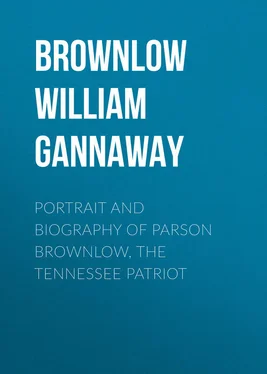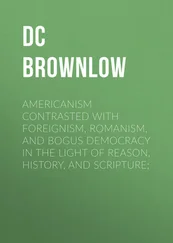William Brownlow - Portrait and Biography of Parson Brownlow, The Tennessee Patriot
Здесь есть возможность читать онлайн «William Brownlow - Portrait and Biography of Parson Brownlow, The Tennessee Patriot» — ознакомительный отрывок электронной книги совершенно бесплатно, а после прочтения отрывка купить полную версию. В некоторых случаях можно слушать аудио, скачать через торрент в формате fb2 и присутствует краткое содержание. ISBN: , Жанр: foreign_antique, foreign_prose, на английском языке. Описание произведения, (предисловие) а так же отзывы посетителей доступны на портале библиотеки ЛибКат.
- Название:Portrait and Biography of Parson Brownlow, The Tennessee Patriot
- Автор:
- Жанр:
- Год:неизвестен
- ISBN:http://www.gutenberg.org/ebooks/35122
- Рейтинг книги:5 / 5. Голосов: 1
-
Избранное:Добавить в избранное
- Отзывы:
-
Ваша оценка:
- 100
- 1
- 2
- 3
- 4
- 5
Portrait and Biography of Parson Brownlow, The Tennessee Patriot: краткое содержание, описание и аннотация
Предлагаем к чтению аннотацию, описание, краткое содержание или предисловие (зависит от того, что написал сам автор книги «Portrait and Biography of Parson Brownlow, The Tennessee Patriot»). Если вы не нашли необходимую информацию о книге — напишите в комментариях, мы постараемся отыскать её.
Portrait and Biography of Parson Brownlow, The Tennessee Patriot — читать онлайн ознакомительный отрывок
Ниже представлен текст книги, разбитый по страницам. Система сохранения места последней прочитанной страницы, позволяет с удобством читать онлайн бесплатно книгу «Portrait and Biography of Parson Brownlow, The Tennessee Patriot», без необходимости каждый раз заново искать на чём Вы остановились. Поставьте закладку, и сможете в любой момент перейти на страницу, на которой закончили чтение.
Интервал:
Закладка:
I have committed no offence – I have not shouldered arms against the Confederate Government, or the State, or encouraged others to do so – I have discouraged rebellion publicly and privately – I have not assumed a hostile attitude toward the civil or military authorities of this new Government. But I have committed grave, and I really fear unpardonable offences. I have refused to make war upon the Government of the United States; I have refused to publish to the world false and exaggerated accounts of the several engagements had between the contending armies; I have refused to write out and publish false versions of the origin of this war, and of the breaking up of the best Government the world ever knew; and all this I will continue to do, if it cost me my life. Nay, when I agree to do such things, may a righteous God palsy my right arm, and may the earth open and close in upon me forever.
The real object of my arrest, and contemplated imprisonment, is, to dry up, break down, silence, and destroy the last and only Union paper left in the eleven seceded States, and thereby to keep from the people of East Tennessee the facts which are daily transpiring in the country. After the Hon. Jeff. Davis had stated in Richmond, in a conversation relative to my paper, that he would not live in a Government that did not tolerate the freedom of the press; after the judges, attorneys, jurors, and all others filling positions of honor and trust under the "Permanent Constitution," which guarantees freedom of the press; and after the entire press of the South had come down in their thunder tones upon the Federal Government for suppressing the Louisville Courier , and the New York Day-Book , and other secession journals, I did expect the utmost liberty to be allowed to one small sheet, whose errors could be combatted by the entire Southern press! It is not enough that my paper has been denied a circulation through the ordinary channels of conveyance in the country, but it must be discontinued altogether, or its Editor must write and select only such articles as meet the approval of a pack of scoundrels in Knoxville, when their superiors in all qualities that adorn human nature are in the penitentiary of our State. And this is the boasted liberty of the press in the Southern Confederacy!
I shall in no degree feel humbled by being cast into prison, whenever it is the will and pleasure of the august Government to put me there; but, on the contrary, I shall feel proud of my confinement. I shall go to jail as John Rogers went to the stake – for my principles . I shall go, because I have failed to recognize the hand of God in the work of breaking up the American Government, and the inauguration of the most wicked, cruel, unnatural and uncalled for war, ever recorded in history. I go, because I have refused to laud to the skies the acts of tyranny, usurpation, and oppression, inflicted upon the people of East Tennessee, because of their devotion to the Constitution and laws of the Government, handed down to them by their fathers, and the liberties secured to them by a war of seven long years of gloom, poverty and trial! I repeat, I am proud of my position, and of my principles, and shall leave them to my children as a legacy, far more valuable than a princely fortune, had I the latter to bestow!
With me, life has lost some of its energy – having passed six annual posts on the Western slope of half a century – something of the fire of youth is exhausted – but I stand forth with the eloquence and energy of right to sustain and stimulate me in the maintenance of my principles. I am encouraged to firmness, when I look back to the fate of Him "whose power was righteousness," while the infuriated mob cried "crucify him, crucify him!"
I owe to my numerous list of subscribers the filling out of their respective terms for which they have made advance payments, and if circumstances ever place it in my power to discharge these obligations, I will do it most certainly. But if I am denied the liberty of doing so, they must regard their small losses as so many contributions to the cause in which I have fallen! I feel that I can, with confidence, rely upon the magnanimity and forbearance of my patrons, under this state of things. They will bear me witness that I have held out as long as I am allowed to, and that I have yielded to a military despotism that I could not avert the horrors of, or successfully oppose.
I will only say, in conclusion – for I am not allowed the privilege to write – that the people of this country are unaccustomed to such wrongs; they can yet scarcely realize them. They are astounded, for the time being, with the quick succession of outrages that have come upon them, and they stand horror-stricken, like men expecting ruin and annihilation. I may not live to see the day, but thousands of my readers will, when the people of this once prosperous country will see that they are marching, by "double-quick time," from freedom to bondage. They will then look these wanton outrages upon right and liberty full in the face, and my prediction is they will "stir the stones of Rome to rise and mutiny." Wrongs less wanton and outrageous precipitated the French Revolution. Citizens cast into dungeons without charges of crime against them, and without the formalities of a trial by a jury, private property confiscated at the beck of those in power, the press humbled, muzzled, and suppressed, or prostituted to serve the ends of tyranny! The crimes of Louis XVI fell short of all this, and yet he lost his head! The people of this country, down-trodden and oppressed, still have the resolution of their illustrious forefathers, who asserted their rights at Lexington and Bunker Hill!
Exchanging, with proud satisfaction, the editorial chair and the sweet endearments of home for a cell in the prison, or the lot of an exile, I have the honor to be, &c.,
WILLIAM G. BROWNLOW, Editor of the Knoxville Whig .October 24, 1861.
BROWNLOW IN NASHVILLE
Soon after the Parson was compelled by his enemies to suspend the publication of the Whig , he was prevailed upon by his friends, who more than himself feared for his personal safety, to act upon an intimation of the readiness of the rebel authorities to grant him a safe conduct to the North, and, as stated below, communicated with the Secretary of War at Richmond, Va. The result was that in November last an order was sent to the military commander at Knoxville to take him to the nearest Federal lines. After completing his preparation to go North, notwithstanding his agreement with Secretary Benjamin, he was arrested and thrown into prison a second time.
The imprisonment soon told severely upon the health of the Parson, and after a month he was stricken down with typhoid fever. Permission being granted by the rebel prosecuting attorney, he was removed to his private residence. Here he was laid up for nearly eight weeks. Notwithstanding his prostration by sickness, the rebel surveillance over him did not stop. His house was surrounded day and night by guards. His friends were never allowed to visit him, and the members of his family were not permitted to leave the premises except under guard. Nor was this all. Open insults and threats were offered by the rebel soldiery whenever opportunity afforded. At one time a company of cavalry that had been in the battle of Fishing Creek, and never stopped running until they got to Knoxville, and passing the house when the Parson's wife was looking out of the window, one of the troopers rode up to her, and insultingly asked, "Are you not ashamed to be the wife of that damned traitor and Lincolnite?" Whereupon the ready-witted woman at once replied: "I am glad that I am not the wife of a miserable coward that ran away from a battle-field."
Feeling strong enough to travel, the Parson again wrote to Benjamin, complaining of the bad faith with which he had been treated, and reminding the Secretary of War of the promise of a safe conduct to the Federal lines. A week elapsed, when the post commander at Knoxville received a dispatch directing the Parson to be released from confinement, and to be taken to the nearest Federal outposts over the route most convenient to him, and under an escort of his own choice. In pursuance to this order the Parson left Knoxville accompanied by his doctor, and escorted by Lieutenant O'Brien, an officer in the army, and relative of his wife. The party proceeded by rail, via Chattanooga, to Shelbyville, in Bedford county, in the Southern part of this State. Here they were detained ten days by Morgan's Cavalry, who were engaged in removing a large quantity of bacon and beef stored in the town, and had orders from General Hardee not to allow any one to pass their lines until the whole of the meat had been got away. At last the party were permitted to proceed overland, under a flag of truce, to the pickets of General Wood's division. General Wood at once sent them, under escort, to the city. Parson Brownlow proceeded immediately to the headquarters of General Buell, with whom he had a long interview; afterward repaired to the St. Cloud Hotel, in Nashville, and in the front of the same, on the evening of March 17th, he made the following remarks:
Читать дальшеИнтервал:
Закладка:
Похожие книги на «Portrait and Biography of Parson Brownlow, The Tennessee Patriot»
Представляем Вашему вниманию похожие книги на «Portrait and Biography of Parson Brownlow, The Tennessee Patriot» списком для выбора. Мы отобрали схожую по названию и смыслу литературу в надежде предоставить читателям больше вариантов отыскать новые, интересные, ещё непрочитанные произведения.
Обсуждение, отзывы о книге «Portrait and Biography of Parson Brownlow, The Tennessee Patriot» и просто собственные мнения читателей. Оставьте ваши комментарии, напишите, что Вы думаете о произведении, его смысле или главных героях. Укажите что конкретно понравилось, а что нет, и почему Вы так считаете.











